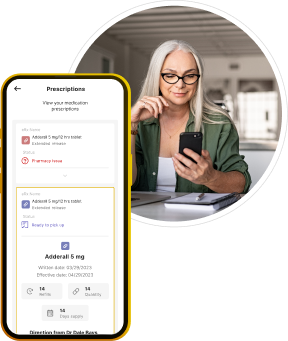Medication Management From Home: Obtain Prescriptions Online
Connect with qualified healthcare providers through a telehealth platform to use online prescription services. Receive prescriptions wherever and whenever you need them.
No insurance is required.
Why Choose MEDvidi
-
Convenient video visits from remote locations
-
Flexible appointment time
-
Evidence-based treatments
-
Affordable professional care
-
24/7 patient support
-
Obtaining new prescriptions and refills online
time
treatments
professional care
and refills online
How to Receive an Online Prescription?
Sign up and schedule an appointment
Fill out an intake form to provide your basic personal information and medical history. Then choose the date and time of your video visit.
Attend your online consultation
Connect with a licensed professional to discuss your symptoms and a treatment plan, including online medication management if necessary.
Receive a prescription
If your health status and diagnosis require that, you will obtain an online medication prescription as well as detailed instructions.
Manage Your Prescriptions Online
- Easy scheduling: Schedule a visit from your couch, any time, no waiting in line!
- Comprehensive visit management: Reschedule your appointment in a few clicks.
- Plan in advance: No forgetting to schedule that follow-up next month!
- Track your prescription online: Check your prescription status anytime and know when the medication is ready to pick up.
- Switch pharmacies: Your chosen pharmacy doesn't have your medication? Select another one in a minute.
- Save personal details: No need to repeatedly fill out personal and medical information. Just choose a date and time to book a visit.

Medications Prescribed and Refilled at MEDvidi
Here you can find a list of medicines our online physicians prescribe.
Initial appointment
$195
- 30-minute online session for new patients
- Detailed examination and diagnosis
- Personalized treatment strategy
- Medication prescription if necessary
Follow-ups
$159
- Online 15-minute visits
- Symptoms monitoring
- Treatment adjustments if necessary
- Refills for existing prescriptions
What’s Involved in Our Online Medication Management Services
We aim to provide access to mental health care to everyone. If you experience a lack of mobility, live in a remote location, have to deal with the unavailability of medical providers, or get tired of long wait times, we are here to help you.
At MEDvidi, you can obtain a prescription over the Internet with convenience and confidentiality. We offer professional care at affordable prices and provide instant notifications about the status of your prescription.
| MEDvidi | Traditional Clinics | |
|---|---|---|
| Cost of an initial visit | $195 | $400-500 |
| Appointments within 24 hours | ||
| Booking or rescheduling visits in a minute | ||
| Saving time on travel | ||
| Video appointments from home or any location | ||
| Online prescriptions sent to your pharmacy | ||
| Fast and caring responses from the Care Team |
See One of Our Experienced Providers
What Types of Medication MEDvidi Doctors Cannot Prescribe?
The rules for prescribing different medications vary by state and involve additional security measures and record-keeping for controlled substances. Controlled substances have a higher potential for abuse and addiction, so they are strictly regulated by the government.
Our healthcare providers are licensed to prescribe controlled substances online if the patient’s diagnosis, medical history, and other health aspects make it a suitable solution. Schedule an appointment to discuss available treatment options and receive personalized recommendations and instructions from an expert.
- Sign up and fill out an intake form to create an account and schedule an appointment.
- Talk to a licensed healthcare provider who can evaluate your symptoms and tell you about suitable treatment options, potentially including online medication management.
- Receive a prescription if you qualify for pharmacological treatment. You can also refill the prescribed medication and discuss treatment adjustments if necessary.
- Your healthcare provider will send your prescription digitally to a local pharmacy of your choice.
Yes, it is possible to be prescribed ADHD medication while undergoing Suboxone treatment. However, because of safety concerns, patients must provide a letter from their clinician indicating that it is safe and appropriate for them to receive stimulant ADHD medication.
If you are currently taking or weaning off Suboxone, healthcare providers at MEDvidi can prescribe you ADHD medication only after obtaining the above-mentioned letter.










